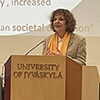The next seminar in the series Department of Philosophy Research Seminars is entitled 'Fitness and Its Discontents - The Pursuit of the High-Status Body as Therapy: A Phenomenological Study'. The speaker is Dr David Vella.
The seminar will be held on Wednesday 11 April from 18.00 to 19.30 in the Faculty of Arts Library, University of Malta Msida Campus.
One only has to make a cursory review of today’s magazine articles, TV programs, internet sites, and social media to realise the significance of the body in our society. We seem to be living in a culture that is obsessed on physical appearance and the maintenance of a healthy lifestyle.
The self is in fact often defined by our culture in accordance to its body. How I look is who I am. And who I am is to improve how I look. Central to the contemporary cult of the body is fitness.
‘Fitness’, as this paper will define it, entails a self-identity centered on the aspiration toward the attainment of the ‘high-status body’: a lean, muscularly toned, and tight physique.
This body-type holds a prestige because of its association with health, youth, sexuality, success, confidence, and vitality. In our times, the pursuit to acquire this ideal is often used as a form of therapy, as a remedial treatment for one’s deepest insecurities. Basing its ideas on the works of contemporary social thinkers such as Anthony Giddens, Christopher Lasch, and Zygmunt Bauman, this paper explores at length the fitness identity from a phenomenological and sociological angle in order to appraise its effectiveness as therapy. In doing so, it will expose its serious limitations, that signal toward its inability to cure us of our personal sufferings. In many cases, it can even aggravate those same sufferings it was supposed to cure as well as create new forms of anxiety of its own.
David Vella is a visiting lecturer in the Department of English at the University of Malta and an IB lecturer of English and Philosophy at St Edward’s College. He has taught on ethics, critical and cultural theory, and modern and contemporary British and American drama and fiction. His research interests include phenomenology, sociology and theory on postmodernity, narrative hermeneutics and ethics, and contemporary dystopian fiction. He has published articles on Michel Houellebecq and the novels of the contemporary extreme.


